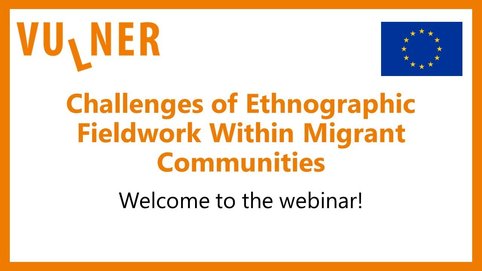Challenges of Ethnographic Fieldwork Within Migrant Communities
On Thursday, October 14, 2021 at 14.00 we organized our second webinar on research methods ‘Challenges of Ethnographic Fieldwork Within Migrant Communities’. Watch it online here.
VULNER Webinar
Ethnographic research within migrant communities living in precarious conditions is mainly conducted by researchers from the Global North, or affiliated to research institutions located in the Global North. This raises additional and specific methodological challenges in terms of positionality and research ethics. These challenges manifest themselves in intertwined ways at various research stages, from the data collection to the data analysis and the communication of the research findings, and at varying degrees depending on the vulnerabilities of the research participants. They include: how to avoid and/or deal with the (often implicit) expectations the research participants may have towards the researchers as a result of their privileged position? How to analyse the data without falling into the trap of a Western centric approach that does not sufficiently account for migrants’ realities, experiences and perspectives? How to present the research findings in accurate ways, without feeding prejudices against migrant communities?
To address these questions, three anthropologists shared their methodological insights based on their past research experiences. Martin Zillinger shared his thoughts on how to cooperate with migrant communities in ways that account for the specific positionality of researchers from the Global North. Sophie Nakueira brought in the perspective of a researcher from the Global South, but affiliated to an institution located in the Global North. Nina Grønlykke Mollerup discussed modes of data analysis that attempts to move beyond Western centric approaches. The presentations were followed by a Q&A session moderated by Maha Shuayb.
Programme
Introduction: Marie-Claire Foblets | Director, Department of Law & Anthropology, Max Planck Institute for Social Anthropology
Speaker: Martin Zillinger | Professor, Department of Social and Cultural Anthropology, Faculty of Humanities, University of Cologne
Speaker: Sophie Nakueira | Senior Research Fellow, Department of Law & Anthropology, Max Planck Institute for Social Anthropology
Speaker: Nina Grønlykke Mollerup | Associate Professor, Saxo Institute, Ethnology and Centre for Advanced Migration Studies, University of Copenhagen
Moderator: Maha Shuayb | Director, Centre for Lebanese Studies
